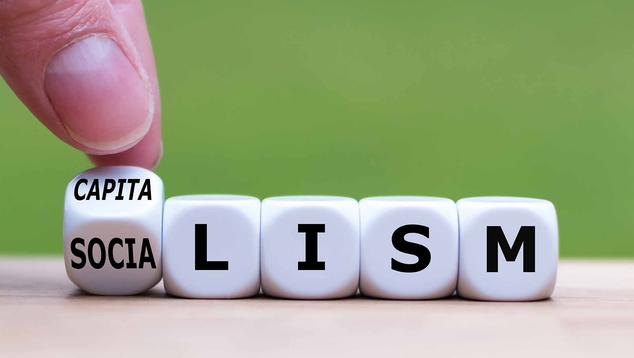My colleague Jeff Jones recently reviewed updated Gallup research on the American public's reactions to the words "socialism" and "capitalism." The new data show little change in these attitudes compared with previous surveys, with 60% of Americans holding a favorable view of capitalism (38% unfavorable), and 38% holding a favorable image of socialism (59% unfavorable).
Gallup's historical tracking of the American public's views of socialism, which includes this year, is timely because the word has a continuing presence in American cultural and political discourse. In doing research for this and several previous articles on the concept of socialism, I find consistent instances in which the word "socialism" crops up in news stories and political dialogue, usually in the context of critical references to federal government spending programs.
Recent examples arise in reference to President Joe Biden's Build Back Better bill now under consideration by Congress. Sen. John Thune of South Dakota called the bill the "Democrats' down payment on socialism"; Montana Sen. Steve Daines called it a "massive expansion of the federal government's socialism"; and Rep. Tom Cole of Oklahoma has given it the sobriquet, "Biden's Build Back Socialist Plan."
The use of the term in American political discussion isn't new. Franklin Roosevelt was frequently called a socialist as he promulgated his New Deal program to mitigate the effects of the Great Depression. Princeton professor Kevin Kruse documents the routine use of the term "socialist" in the U.S. since the 1950s, most commonly as part of negative commentary about programs funded by the federal government -- including the Interstate Highway system and the polio vaccine.
Presumably, conservative politicians, cultural critics and pundits who today evoke the term "socialism" with such frequency are aware that it engenders reactions from the public that split more negative than positive -- particularly among Republicans, 90% of whom have an unfavorable opinion of the term.
But additional research reveals significant variability in exactly what Americans are thinking about when they see or hear the term "socialism." Dr. George Gallup was apparently pondering this issue back in 1949, when he asked Americans, "What is your understanding of the term 'socialism'?" We updated that question a few years ago, and in reviewing this research, I wrote the perhaps obvious conclusion that "Socialism is a broad concept that can be -- and is -- understood in a variety of ways by Americans." I summarized the research by saying: "Americans' views of socialism have broadened [since 1949]. While many still view socialism as government control of the economy, as modified communism and as embodying restrictions on freedoms in several ways, an increased percentage see it as representing equality and government provision of benefits."
Being Positive About Socialism Doesn't Mean One Is Negative About Capitalism
Gallup's survey asks Americans to give their top-of-mind reactions to the words "capitalism" and "socialism" separately, as part of a list of six governmental and economic terms, rather than as a binary forced choice. Americans can in theory express positive opinions about both, negative opinions about both, or a combination of positive and negative views.
It might appear logical that most Americans should embrace one of the economic systems while discrediting the other. But analysis of Gallup data on this topic shows this is not always the case. Significant percentages of Americans simultaneously hold either positive or negative views of both systems. A favorable view of one doesn't preclude holding a favorable view of the other.
I calculated these relationships using data from an aggregate of the two most recent Gallup polls (October 2019 and October 2021) in which the question about capitalism and socialism was included. (The results from these two are similar.) We end up with four categories: positive about both, negative about both, positive about capitalism/negative about socialism, and positive about socialism/negative about capitalism.
| U.S. adults | |
|---|---|
| % | |
| Favorable toward both | 21 |
| Favorable capitalism/Unfavorable socialism | 39 |
| Favorable socialism/Unfavorable capitalism | 17 |
| Unfavorable toward both | 18 |
| Based on aggregated data from Oct. 1-13, 2019, and Oct. 1-19, 2021, polls | |
| GALLUP | |
As can be seen in the accompanying table, Americans' combined views of the two concepts are quite varied. The two middle categories -- representing Americans who have a positive opinion about one of the concepts and are negative about the other -- are seemingly the most logical and are held by a total of 56% of Americans. As would be expected, given Americans' overall more positive views of capitalism, the tilt is toward the positive view of capitalism/negative view of socialism category (39%), while about half that number (17%) hold a positive view of socialism and a negative view of capitalism.
About four in 10 Americans (39%) hold views that illustrate more complicated conceptions of the two economic systems. About one in five Americans (21%) are positive about both capitalism and socialism. This group presumably has no problem embracing the two concepts simultaneously. The 18% who are negative about both economic systems are presumably skeptics with jaundiced views of both systems.
Of the 38% of Americans overall who are favorable toward socialism, a little more than half also are favorable toward capitalism. That leaves a reduced 17% of Americans who are critical of capitalism and who embrace socialism as a replacement.
Republicans More Consistent Than Democrats in Their Views
Republicans are significantly more straightforward in their opinions about the two concepts than are Democrats.
| Republicans/Leaners | Democrats/Leaners | |
|---|---|---|
| % | % | |
| Favorable toward both | 7 | 34 |
| Favorable capitalism/Unfavorable socialism | 67 | 17 |
| Favorable socialism/Unfavorable capitalism | 5 | 28 |
| Unfavorable toward both | 19 | 16 |
| Based on aggregated data from Oct. 1-13, 2019, and Oct. 1-19, 2021, surveys | ||
| GALLUP | ||
About two-thirds of Republicans and independents who lean Republican are in the predictable (and logical) category of being favorable toward capitalism and unfavorable toward socialism. Some 19% are unfavorable about both, with small percentages in the other two groups.
Democrats and independents who lean Democratic are much more varied in how they respond to the two concepts. We know from Gallup's basic analysis of the results that Democrats are significantly more likely than Republicans to be favorable about socialism, and this reality is manifested in the finding that over six in 10 Democrats are in one of two groups with a positive view of socialism. But the majority of Democrats who have this positive view are favorable about both concepts -- socialism and capitalism, leaving just 28% of Democrats in the category that conservative critics are most likely to ascribe to them: positive views of socialism and negative views of capitalism.
Summary
A fairly constant four in 10 Americans have held a favorable view of socialism across six surveys conducted by Gallup since 2010, while a similarly constant six in 10 have held favorable opinions of capitalism. A little more than half of those who hold a favorable opinion of socialism also are favorable toward capitalism, underscoring that Americans can see benefits in both economic systems and may favor some type of hybrid economic system.
And while the majority of Democrats have a positive view of socialism, more than half of this group is also positive about capitalism. Two-thirds of Republicans, by contrast, hold a negative view of socialism and a positive view of capitalism.
To stay up to date with the latest Gallup News insights and updates, follow us on Twitter.




